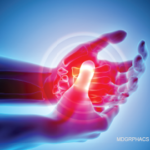
BOSTON—Guidelines for the management of rheumatoid arthritis (RA) always spark interest and debate among rheumatologists. A recent glimpse at a draft of the new recommendations for RA treatment was no exception.
On Nov. 16, 2014, in Boston, attendees at the ACR/ARHP Annual Meeting packed a large auditorium, even sitting on the floor in front of the panelists’ table, to read and discuss New ACR Recommendations for the Management of Rheumatoid Arthritis (RA).
Guideline development group members presented a thorough explanation of techniques for gathering and measuring the value of scientific evidence to support the development of treatment recommendations. They also shared a first look at the in-progress guidelines, including emerging approaches to treatment during RA flares and the use of live vaccines in RA patients currently taking biologics. The final guidelines will be jointly published in Arthritis & Rheumatology and Arthritis Care & Research in summer 2015. Since the last RA guidelines update in 2012, new RA therapies, such as tofacitinib, have been approved, driving the need for an update.
GRADE: A Paradigm Shift

The guideline development group began the update project in December 2013. The process used represents a paradigm shift in the approach the ACR uses to develop guidelines, said Timothy McAlindon, MD, MPH, professor of medicine at Tufts University School of Medicine in Boston.
Past ACR RA management guidelines and updates, including those published in 2008 and 2012, used the RAND/UCLA methodology to gather, measure and filter evidence to support recommendations. “But even the RAND/UCLA approach lacked transparency,” he said. For the upcoming 2015 RA guideline, the ACR used GRADE methodology, which incorporates a more “transparent, granular literature review,” he said. GRADE, which stands for Grading of Recommendations, Assessment, Development and Evaluation, incorporates considerations of the quality of evidence, sample sizes, effect sizes and the type of study used. Recommendations may be labeled as strong or conditional depending on these factors, he said.
One of the most important parts of the process in forming the upcoming management recommendations was the development of PICO (population, intervention, comparators, outcomes) questions focusing on RA management issues and treatment approaches, Dr. McAlindon said. Development group members began by generating questions reflecting important clinical scenarios in RA treatment and defining outcomes related to those scenarios. They then gathered and systematically reviewed the available evidence on those topics/outcomes, and subsequently rated the quality of the evidence across outcomes, for each clinical question. The next step was to ask a panel to consider the evidence in light of their own experience and expertise, and draft recommendation statements that could be included in the final guideline. The next step will be to write the guideline paper and submit it to the journals and ACR for approval.



